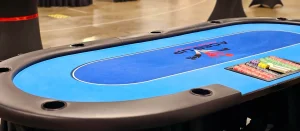Mastering Poker Math for Better Decision Making
3 min read
Poker is a game of skill and strategy, but also involves math. A firm grasp of poker math can drastically enhance your decision-making processes and lead to more wins for you.
Mastering Poker Math is an invaluable asset to players looking to elevate their tournament game. By developing this skill, players will gain a deeper insight into probabilities and odds as well as understand equity and expected value more clearly.
Probability and statistics
Poker is a game of skill and strategy, but also features an intricate web of probabilities and statistics that is integral to its existence. Leveraging these concepts to enhance your overall strategy can significantly increase the chance of long-term victory; plus knowing about these aspects will help prevent mistakes or misperceptions from emerging in play.
Poker math is essential to your success, whether that means analyzing opponent bluffing behavior or calculating pot odds. While many players dislike mathematics, understanding its role will allow you to build a solid strategic foundation and outwit your opponents at the table.
Pot odds
Poker is both an art and science; pot odds and expected value calculations provide invaluable mathematical information on your hand which can guide whether to call or fold.
An experienced player’s first step will be comparing the pot odds against their chances of improving their hand, and calling/folding accordingly. If pot odds exceed improving hand odds, they will call/fold accordingly.
No-limit hold’em players new and experienced alike should take this crucial step, and practice poker math regularly as part of their gameplay. Soon it will become second nature to them and make better decisions at the table.
Equity
Poker is a mathematical game rooted in statistics, so understanding how to make mathematically sound decisions is central to being an effective poker player. But math alone will not get the job done: people reading skills will also help maximize winnings at the tables.
Calculating ranges accurately is key to making optimal decisions in poker, and learning it can significantly enhance your gameplay experience.
This course provides the fastest and simplest methods to achieve this. While primarily targeted toward tournament play, its concepts can easily be applied to cash games as well.
Betting intervals
Depending on the game, Poker deals may include one or more betting intervals. At each betting interval, one or more players place chips into the pot – and any subsequent player must either call (put in exactly as many chips as their predecessor) or drop. “Checking” may also be permitted during some betting intervals – in general though not during final one where best hand wins pot!
Bluffing
Bluffing is an artful dance of strategy, psychology and intuition. A skilled bluffer can turn even weak hands into winning ones by deceiving opponents into calling their bets – yet this comes at the cost of increased risks – it is important to carefully choose your situations and opponents when using this strategy, in addition to avoiding tight players who call everything.
Ethics are subject to interpretation in each situation, from playing poker to business negotiations and beyond. Bluffing may be seen as acceptable practice while using deception to gain an unfair advantage is likely considered unethical. As always, one’s moral compass will depend on societal norms and personal values; emotional responses caused by successful and unsuccessful bluffs can play a part in whether they attempt them again.






